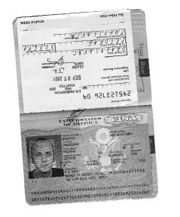I DON’T KNOW how it feels to be anti-Taliban in Afghanistan now that the “World War on Terrorism” has started, but I do know how it felt to be anti-regime in Belgrade, Serbia, during NATO’s “humanitarian intervention” in the spring of 1999: desperate and hopeless, stuck between two fires.
On one side, there were NATO’s “smart” missiles hitting so-called “legitimate military targets” like military and government buildings but also bridges, heating plants, and national TV and its transmitters. On the other, there was Slobodan Milosevic for whom the bombing was a perfect opportunity to “clean up” everyone who dared to oppose him. Milosevic used three major weapons to punish his enemies: assassination, imprisonment, or the draft.
Liberal opposition in Serbia went on the run, either out of the country or deep underground. As a “traitor and foreign mercenary,” one opposition leader was “wanted dead or alive” (so he managed to leave the country); a second was mobilized for the army; and a third was held in home detention because he was considered by the regime to be a “locator for NATO’s cruise missiles.” Proclaiming support for “Western democracy” at that time was like committing suicide.
Everyone who had a chance left. Budapest became like Casablanca: Thousands of people were there without knowing what to do with their lives other than wait—for a Canadian, Australian, or some other visa, or Hungarian papers, or just the end of the shit.
Fliers dropped from the NATO planes saying that the Western allies were targeting Milosevic and his military apparatus and not the ordinary people sounded cynical when everybody’s life was in tatters. There was no electricity, no gasoline, no sugar or oil, no cars or public transportation, no cigarettes or tranquilizers, no showers for days.
But there were also some things that many ordinary people began to appreciate during NATO’s bombing. Many people started to ride bicycles because it was often the only means of transportation. There was, though, a little dilemma when you came to a bridge—to cross or not to cross? You never knew which bridge might be a “legitimate military target.” So you just closed your eyes and pedaled.
Everybody says that sex was extraordinary during the bombings. After all, each time you made love might have been the last. The birth rate soared.
Now, of course, there is a theory that Milosevic fell from power because of the bombing. I don’t agree, but even if I did, that theory is only part of the truth. The most important other parts are: The tyrant had lost his sense of reality and called for an early election, and the liberal opposition was finally united and had a good presidential candidate.
“So, what would you do if you were American?” one American friend of mine asked. The perspectives of a Serbian and an American are so different, it’s almost impossible for me to say. Although I have lived in the U.S., speak the language, and consume its culture, it is very hard to see things from an American point of view. Hard but useful. Because when you try to see through someone else’s eyes you see the problems in much wider perspective.
“It depends. What is the goal?” I answered. I have experienced how “smart” political measures, such as economic sanctions, bombing, and political isolation of one country, are felt on the ground. If the goal is to make ordinary people poorer, more desperate and even more hopeless, to provoke another flood of immigrants, and to “cement” the power of power holders and their mafia brothers, then there is nothing better than these “smart” measures. That’s exactly what happened in Serbia. On the other hand, if the goal is to neutralize the influence of the extremists and support moderate political options in a certain country, then, unfortunately, there is no easy solution like “bombing to the stone age.” It’s much more complicated, complex, and sensitive, and it’s hard to see the results in the short term.
Predrag Dragosavac is working at Seattle Weekly through Freedom House’s visiting fellows program.




